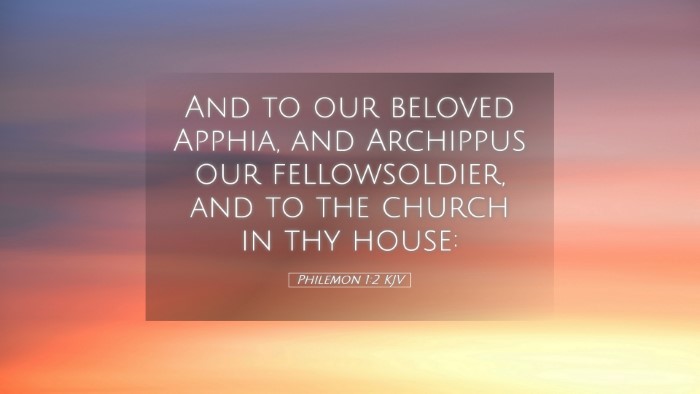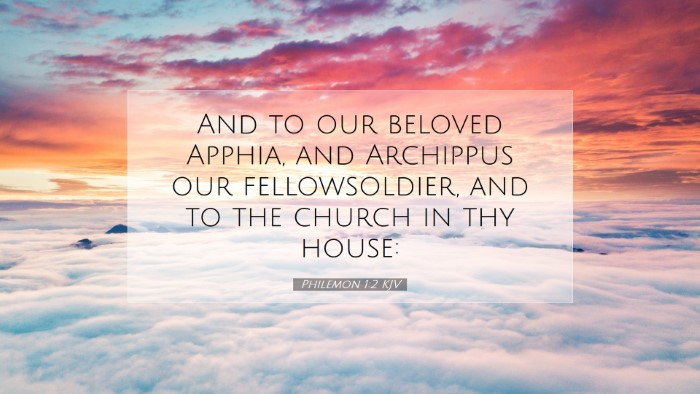Commentary on Philemon 1:2
Verse Reference: Philemon 1:2 - "And to our beloved Apphia, and Archippus our fellowsoldier, and to the church in thy house."
Introduction
Philemon is a unique letter within the New Testament, primarily because it addresses a personal matter between Paul and Philemon regarding Onesimus, a runaway slave. This verse serves as an introductory greeting that not only identifies key individuals in Philemon's life but also emphasizes the communal aspect of faith. This commentary will explore significant insights drawn from several public domain commentaries.
Analysis of Key Components
- Beloved Apphia:
Matthew Henry highlights Apphia's status as Philemon's wife, suggesting that she played a significant role in the church that met in their home. The term 'beloved' indicates a deep affection that Paul had for her, positioning her as equally esteemed within the Christian fellowship.
- Archippus, our fellowsoldier:
Albert Barnes notes that Archippus is likely a minister of the church, possibly Philemon's son. The use of 'fellow soldier' implies he was engaged in the spiritual battle, working alongside Paul and contributing to the spread of the Gospel. This term suggests partnership and mutual support in ministry, which is particularly meaningful for those in Christian leadership.
- The church in thy house:
Adam Clarke elaborates on the significance of home churches during this period. Philemon's house served as a gathering place for believers, indicative of the early church's structure before the establishment of larger church buildings. This context reinforces the concept of community in faith—believers gathering together to worship and support one another.
Theological Implications
- Community and Fellowship:
This verse illustrates the importance of fellowship in the Christian faith. Paul intentionally acknowledges members of Philemon's household, which serves as a reminder that faith is often practiced within the context of community. As Henry points out, the warmth of these greetings highlights the love and bond shared among believers.
- Roles within the Church:
In recognizing Apphia and Archippus, Paul affirms the diverse roles individuals play within the church. Whether through leadership, service, or support, each has a part to play. The identity of Archippus as a 'fellow soldier' speaks to the active, sometimes challenging work of ministry. Barnes indicates that leadership is not a solo endeavor; rather, it requires teamwork and collaboration.
- House Churches:
The mention of the church in Philemon's home underscores an essential aspect of early Christian life. Clarke emphasizes that such an arrangement allowed for intimate fellowship, teaching, and support, reinforcing the necessity of believers assembling together. Modern congregations can learn from this model, valuing small group gatherings for spiritual growth.
Conclusion
Philemon 1:2 sets the stage for the entire letter, woven with themes of love, community, and the importance of relationships within the church. Through this greeting, we see how significant it is for leaders to acknowledge and honor those working alongside them in faith. For pastors, students, and theologians, this passage invites contemplative reflection on their personal roles and the communal nature of their journeys in Christ. As the early church gathered in homes, so too should today's believers cultivate deep, purposeful relationships with one another within the body of Christ.
Reflection Questions
- How can modern churches foster a sense of community akin to the early house churches?
- In what ways are we recognizing and encouraging the 'fellow soldiers' in our midst?
- What actions can we take to better support those who serve in our churches?


